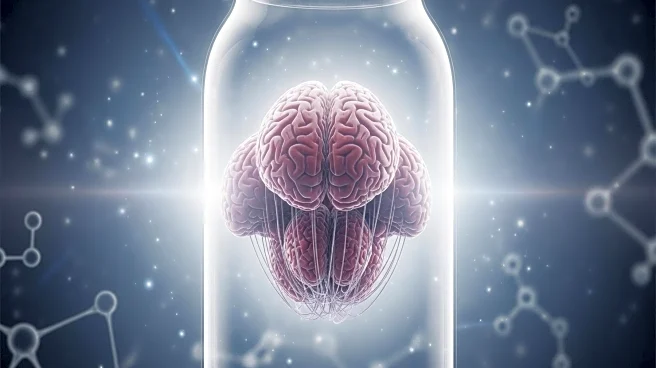What is the story about?
What's Happening?
Madeline Lancaster, a researcher at the MRC Laboratory of Molecular Biology in Cambridge, UK, has pioneered the development of brain organoids, which are small, self-organizing balls of cells that mimic early stages of brain tissue development. These organoids have become instrumental in brain research, providing insights into human brain uniqueness and potential applications in disease treatment. Lancaster's work has revealed that human stem cells develop more slowly than those of mice or chimpanzees, leading to more neurons and potentially explaining human cognitive complexity. Despite their promise, brain organoids raise ethical concerns, particularly when transplanted into animal brains, as they can disrupt cognitive functions without enhancing them.
Why It's Important?
The development of brain organoids represents a significant breakthrough in neuroscience, offering a new window into the complexities of the human brain that traditional animal models cannot replicate. This research has implications for understanding genetic differences between humans and other species, potentially leading to new treatments for mental health disorders and neurodegenerative diseases. However, the ethical implications of using brain organoids, especially in animal testing, require careful consideration. The potential for these organoids to be used in drug screening and therapy highlights their importance in advancing medical research, but also underscores the need for ethical guidelines in their application.
What's Next?
Future research will likely focus on overcoming the limitations of brain organoids, such as their lack of vasculature and other cell types, to improve their functionality and applicability in medical treatments. Efforts to introduce vascular cells are underway, but achieving functional blood perfusion remains a distant goal. As the field progresses, researchers will need to address ethical concerns, particularly regarding the potential for organoids to develop consciousness. Establishing criteria for measuring consciousness and ensuring organoids remain below human-level consciousness will be crucial as the technology advances.
Beyond the Headlines
The ethical dimensions of brain organoid research are complex, involving questions about consciousness, the definition of life, and the potential for creating sentient beings. As organoids become more advanced, researchers must navigate these ethical challenges, balancing scientific progress with moral responsibility. The long-term implications of this research could reshape our understanding of human cognition and the treatment of brain disorders, but also require a reevaluation of ethical standards in scientific research.
















